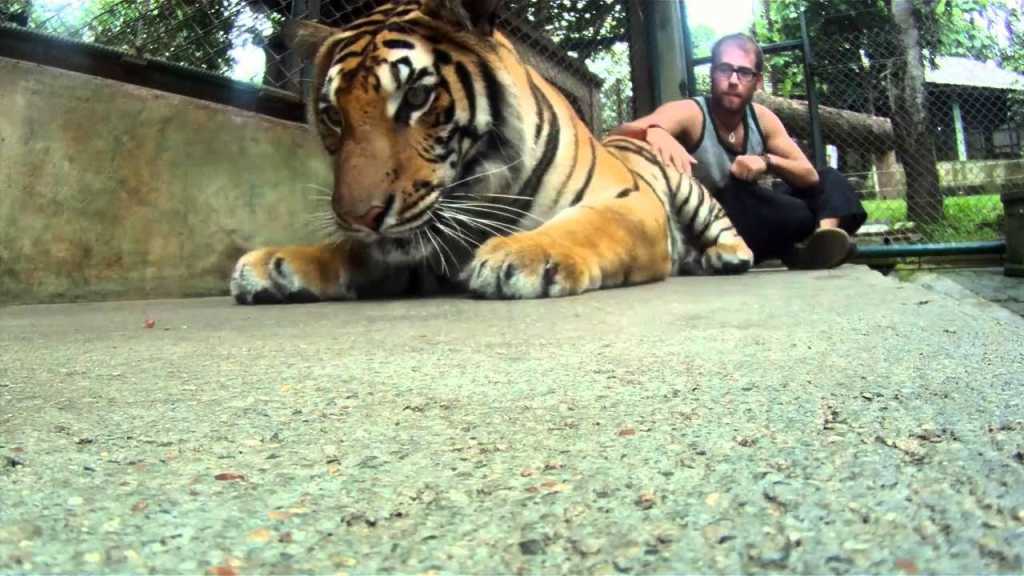Every now and then there are moments you wish you could take back. This occurs in all facets of life regardless if its work, play et cetera. Travel experiences can be no different. Things which have you enraptured can be regretful later down the track when hindsight kicks in. I’m not talking about that one night stand you had either, although some would say this fits perfectly into the category, I’m talking about ethical choices in a foreign land.
Recently, through the joys of Facebook, I was reminded of a day I experienced in Thailand a few years ago. A friend and I spent the day doing stereotypically tourist things that a vast number have done before and many more will do in the future. We visited the tiger, monkey and snake attractions outside Chiang Mai in Northern Thailand. It was a choice we made without much hesitation like most spur of the moment travel decisions.
We walked into a place and were confronted by a cage containing tigers. There was a viewing area set up to watch people who had paid large sums of cash to enter said cage to pat the giant cats as though they were kittens. The staff were armed with bamboo sticks to protect any potential incident but something didn’t feel right watching a jungle cat lay submissively, a groggy haze obvious in their eyes. It is a wholly unnatural feeling to step into a cage with a tiger and realise that its instinct is to kill you, but the drugs in its system prevent it from doing anything other than letting hundreds of tourists each day scratch its behind (because tigers like that, apparently) whilst taking a couple of happy snaps.
Next on the itinerary was taking in a monkey ‘sanctuary’. There are literally hundreds of similar setups around Asia − some good, others poor. Regardless, we sat in a small, outdoor auditorium and watched a monkey push a little cart, lift monkey sized weights and correctly guess the answers to various maths problems. The show was even commentated by a lovely Thai lady:
“Look at the monkey pushing the cart. He is so clever. Now he lifts the weights. You very strong monkey. Wave to the people…”
The thing that struck me as strange was that he had to be tied up on a leash the entire time. He had this sad look on his face like a teenager forced to work in his parents shop on a Saturday afternoon − there were plenty of other places he wanted to be. I was also suspicious on why he was carrying around a tip jar. I doubt he was allowed down to the corner store on smoko with his earnings.
To finish off the day, we ended up at a reptile park − the kind of place where the non-English speaking staff member encouraged guests to get into the cobra cage. The assurance that fangs had been removed was no comfort; all I knew was that tapping a snake with a stick until it gets angry is not advisable. I’m probably more of a ‘natural environment’ kind of guy, not so much a ‘poke it until it’s angry and wants to bite you’ sort of person.
At the time, this day was great. We were in a foreign country, seeing and doing things that could not be seen or done back home. Getting close to exotic animals was something of a novelty and one that we relished.
Although I had a great time, something didn’t sit well with me. The treatment of exotic animals for a tourist buck, especially tigers, seemed wrong. The fact that in the last couple of months, a place like these was publicly shut down for mistreatment of its attractions punctuated this regret. (My mind has been eased in the knowledge that we didn’t choose to fire bazookas at cows later when in Cambodia. To this day, I’m not sure if it is something that could actually be done or whether, hopefully, it’s just a sick travel myth.)
It should be noted that tourist attractions that treat animals in the correct manner do exist. If you want to see animals, research businesses that are ethical and have a strong focus on conservation. Discover what is and isn’t acceptable before you go to a new place and do your best to encourage behaviour and decisions that will benefit the places you have been. You can’t change the choices you have made when travelling. But you can learn from them.
